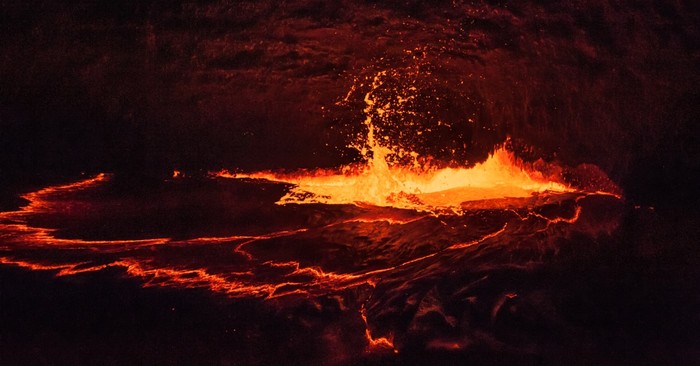
What comes to mind when you think of the lake of fire?
For many Christians, terms like Gahenna, Sheol, Hades, Hell, and the lake of fire may have been used interchangeably. However, these terms have different meanings. Is the lake of fire just another name for hell? Or is it something else?
The lake of fire is the final destination of those who reject Christ. As explained in the book of Revelation, it is where the beast, the false prophet, the devil, and anyone whose name is not written in the book of life will end up.
Revelation 20:14 says that God will also throw death into the lake of fire; death will no longer threaten His people in the new heaven and new earth.
More than earthly death, the lake of fire is the ultimate death. Because this concept is so vital to our Christian faith, let’s answer seven burning questions many have about the lake of fire:
Photo Credit: ©Getty Images/Brina Bunt
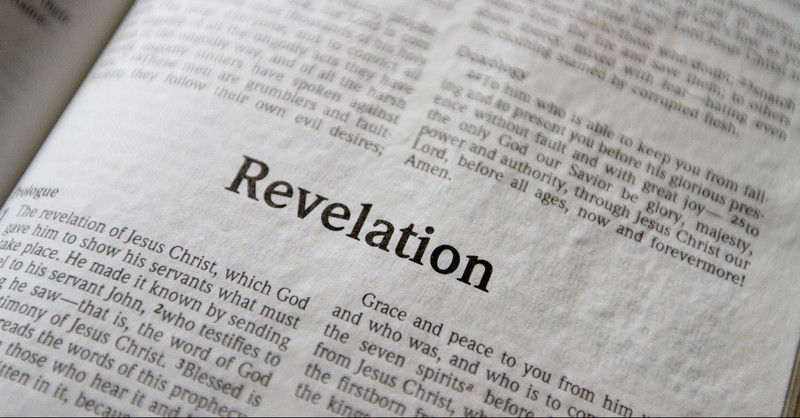
1. Where Is the Lake of Fire Mentioned in the Bible?
Though fiery imagery of judgment is found throughout the Bible, the term “lake of fire” is only found in the book of Revelation.
The first is Revelation 19:20:
But the beast was captured, and with it the false prophet who had performed the signs on its behalf. With these signs he had deluded those who had received the mark of the beast and worshiped its image. The two of them were thrown alive into the fiery lake of burning sulfur.
In the King James Version, this is translated as “a lake of fire burning with brimstone.”
Revelation 20:10 adds:
And the devil, who deceived them, was thrown into the lake of burning sulfur, where the beast and the false prophet had been thrown. They will be tormented day and night for ever and ever.
Revelation 20:14-15 says:
Then death and Hades were thrown into the lake of fire. The lake of fire is the second death. Anyone whose name was not found written in the book of life was thrown into the lake of fire.
And Revelation 21:8 concludes:
But the cowardly, the unbelieving, the vile, the murderers, the sexually immoral, those who practice magic arts, the idolaters and all liars—they will be consigned to the fiery lake of burning sulfur. This is the second death.
Photo Credit: ©SparrowStock
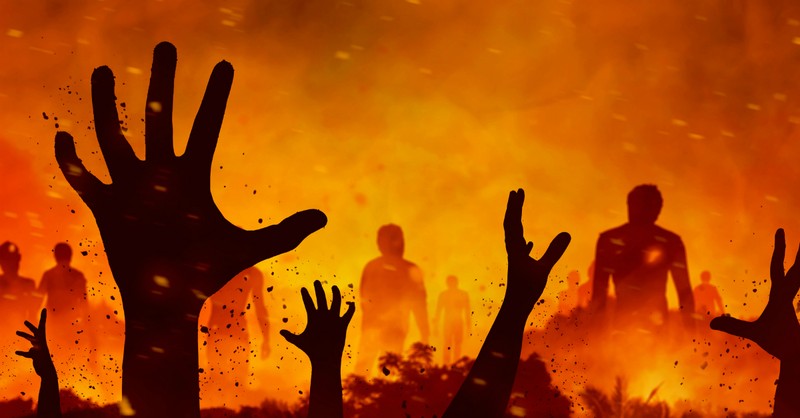
2. Is the Lake of Fire Hell?
Our English word “hell” doesn’t have a direct translation in the Bible. Many terms are used interchangeably nowadays to refer to what awaits those who reject Christ, but the Bible differentiates. Let’s unpack the different terms that the Bible uses.
In the Hebrew Scriptures of the Old Testament, the place after death is commonly referred to as “the grave” or “Sheol” (e.g. Genesis 44:29, Psalm 18:5, Psalm 89:48, Job 7:9). This is just the place of the dead, not necessarily relegated to good or evil. “Hades” is the New Testament Greek equivalent of Sheol.
“Gehenna” is the word used in the New Testament for what we might think of more as hell, and is used to refer to a place of punishment, fire, or banishment (e.g. Matthew 5:22, Matthew 5:29-30, Matthew 10:28, James 3:6).
The lake of fire of Revelation is what might be called a final hell. Note that death and Hades are thrown into the lake (Revelation 20:14), indicating that it is separate from Hades.
The implication is that the souls of those who rejected God wait in Hades until the time comes for the final judgment of Revelation 20:12-15:
And I saw the dead, great and small, standing before the throne, and books were opened. Another book was opened, which is the book of life. The dead were judged according to what they had done as recorded in the books. The sea gave up the dead that were in it, and death and Hades gave up the dead that were in them, and each person was judged according to what they had done. Then death and Hades were thrown into the lake of fire. The lake of fire is the second death. Anyone whose name was not found written in the book of life was thrown into the lake of fire.
Photo Credit: ©GettyImages/FOTOKITA
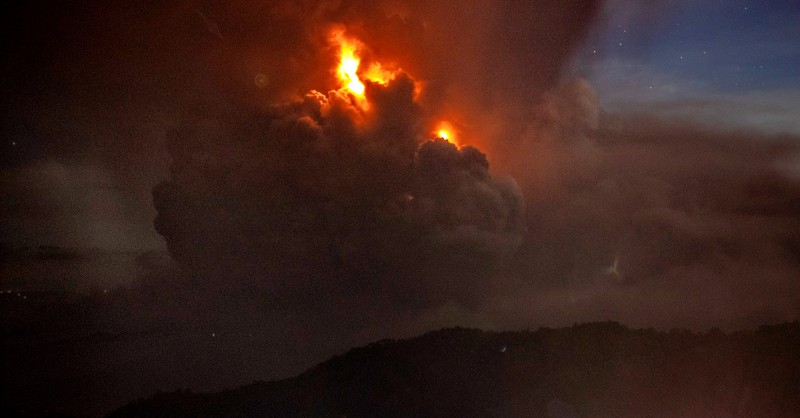
3. Is the Lake of Fire a Real Place?
The consistent warnings of the prophets, Jesus, and the apostles all point to the very real danger of an after-death destruction.
When sending out His disciples, Jesus said, “Do not be afraid of those who kill the body but cannot kill the soul. Rather, be afraid of the One who can destroy both soul and body in hell” (Matthew 10:28).
Throughout the Bible, an eternal demise is treated as a very real threat. The Bible warns not just of temporary suffering, but eternal death: “They will be punished with everlasting destruction” (1 Thessalonians 1:9).
4. Is the Lake of Fire Meant to Be Taken Literally?
The lake of fire may be real, but is it a literal lake of boiling flame?
This is something we don’t know.
The Bible uses a lot of figurative language regarding fire. It is used to portray a refining force, purging iniquity. For example, Zechariah 13:9 says, “This third I will put into the fire; I will refine them like silver and test them like gold. They will call on my name and I will answer them; I will say, ‘They are my people,’ and they will say, ‘The Lord is our God.’”
It is also often used to speak of destruction. When God wanted to warn of imminent destruction through the Old Testament prophets, He often used fire imagery. For example, Isaiah 66:15-16 says, “See, the Lord is coming with fire, and his chariots are like a whirlwind; he will bring down his anger with fury, and his rebuke with flames of fire. For with fire and with his sword the Lord will execute judgment on all people, and many will be those slain by the Lord.”
On the other hand, sometimes, the fiery judgment is literal. In Genesis 19, the wicked cities of Sodom and Gomorrah were famously destroyed by the Lord with burning sulfur from the heavens.
Whether the lake of fire is a literal pool of lava or this is just a metaphor for something we can’t fully comprehend, it is clear that the lake of fire is a place of ultimate destruction, the inescapable destination of Satan and those who rebelled against God, the second death.
Photo Credit: ©Getty Images/Ezra Acayan/Stringer
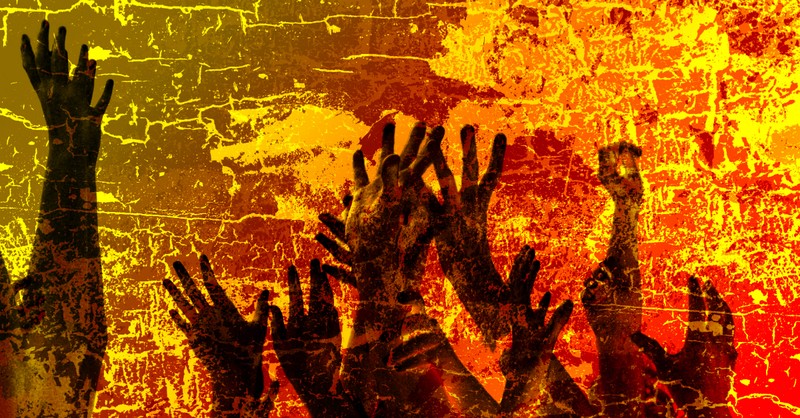
5. Who Goes to the Lake of Fire?
Revelation 19:20 states that the beast and the false prophet will be cast in the lake of fire.
The beast in Revelation alternately refers to an evil empire and the person who leads said empire, perhaps the Antichrist. The beast cast in the lake of fire is presumably this person.
The false prophet in Revelation stands alongside the beast, driving humanity to worship the Antichrist. It appears that while the beast will be a political leader, the false prophet will be a “spiritual” leader (Revelation 13:11-15), deceiving the people.
These two will be cast into the lake of fire along with the devil who empowered them both (Revelation 20:10).
Finally, these three will be joined by the unrepentant dead, those who rejected Christ (Revelation 20:15 and Revelation 21:8).
6. What Happens to Those Thrown in the Lake of Fire?
Revelation 20:10 makes it clear that the devil will suffer eternally, “tormented day and night for ever and ever.” There is less agreement, however, on the fate of all others in this situation.
A common understanding of the penalty of sinfulness is that of eternal torment. However, the Bible doesn’t necessarily say that. Paul states that the wages of sin is death (Romans 6:23), and both Revelation 20:14-15 and Revelation 21:8 call the lake of fire “the second death.” Because of this, one understanding of these passages is that all human souls cast into the lake of fire are destroyed forever. As the first death was the cessation of the physical body, the second death is the cessation of the soul.
Furthermore, some point out that the translation of Revelation 20:10 isn’t precise in who “they” are who will be “tormented day and night,” as the third person plural of the future indicative passive tense for “tormented” in the Greek is all one word and could also refer to Satan and his demons’ eternal torment, not that of Satan and the beast and prophet.
Satan is thrown into the lake of fire where the beast and the false prophet “had been thrown” or “had already been thrown,” meaning it is possible that they were already destroyed. (The Greek only includes the conjunction “kai,” meaning translators had to insert English words based on context.)
Others interpret these passages, rather than death and Hades being thrown into the lake of fire and destroyed, as indicating that the souls thrown in the lake of fire will suffer eternal torment along with Satan and his demons, citing passages such as Matthew 13:42, “They will throw them into the blazing furnace, where there will be weeping and gnashing of teeth.”
Either way, those thrown into the lake of fire are cut off from God forever.
Photo Credit: ©GettyImages/Pictograph

7. How Can We Avoid the Lake of Fire?
The lake of fire is the ultimate destination of the enemies of God. However, Revelation 21 and Revelation 22 paint a beautiful picture of the eternal home of those who follow God.
Revelation 21:3 says:
Look! God’s dwelling place is now among the people, and he will dwell with them. They will be his people, and God himself will be with them and be their God. ‘He will wipe every tear from their eyes. There will be no more death’ or mourning or crying or pain, for the old order of things has passed away.
We do not earn God’s favor.
Ephesians 2:8-9 says:
For it is by grace you have been saved, through faith—and this is not from yourselves, it is the gift of God—so that no one can boast.
We don’t have to work our way into God’s good graces. Instead, it is a gift.
We receive this gift simply. Romans 10:9-10 explains:
If you declare with your mouth, ‘Jesus is Lord,’ and believe in your heart that God raised him from the dead, you will be saved. For it is with your heart that you believe and are justified, and it is with your mouth that you profess your faith and are saved.
Those who are in Christ need not fear our eternal destiny. In John 14:2-3, Jesus tells us:
My Father’s house has many rooms; if that were not so, would I have told you that I am going there to prepare a place for you? And if I go and prepare a place for you, I will come back and take you to be with me that you also may be where I am.
Instead, let us rejoice in God’s promises, and share His Gospel wherever we go.
Recommended for You:
10 Things You Should Know about Hell
What Should Pastors Preach about Hell?
How Do I Know if I'll Go to Heaven?
Photo Credit: ©Getty Images Plus/FOTOKITA
Originally published Saturday, 24 October 2020.








